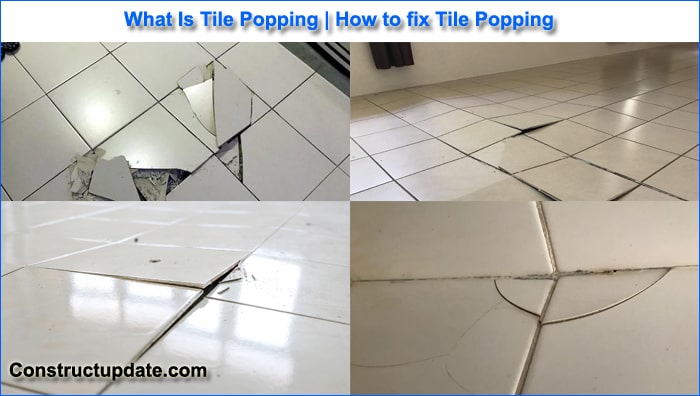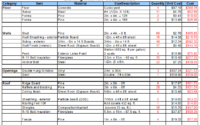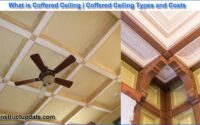What is Tile Popping | Causes of Popped up Tiles | How To Repair Pop-Up Tiles
People always consider how the chosen tiles will affect the aesthetic appearance of their home or living space when choosing to floor for their home. Tile popping is common problems that can be seen in construction flooring. Due to its modern style and aesthetic appeal, tile flooring is one of the most widely used flooring choices today. In addition to all the positive aspects, tile requires proper installation as well as maintenance both during and after installation.
Various faults, such as bucking or popping up of tiles, cracking of tiles, fading of tiles, etc., may emerge on the tile surface with the passage of time and exposure to the environment if sufficient care is not taken during and after tile installation. Pop-up, tenting, or buckling tiles are among the most prevalent tile flaws that have been noted in floor tiles installed in a variety of locations exposed to a variety of environmental variables.

What Is Tile Popping?
When floor tiles break out, crack, or flex, the floor becomes uneven. This is known as “tile popping.” Nowadays, most homes have floor tiles instead of marble or concrete.
The marble floor doesn’t need to be polished or finished in any way to be lovely. The tiles are lovely right away. The popping of tiles is a common annoyance.
While there are several causes of tile breaking, one of the most frequent ones is air trapped in the floor. In some weather patterns, this air could cause the tiles to break. The air trapped and pressure from the side tile push out even more.
Since smaller tiles are more likely to pop or break than larger ones, many people choose them. Therefore, the choice is made to solve the issue using large-scale tiles.
What are the Causes for Tile Popping
There are several causes of pop-up or buckled tiles, including the following:
Improper Cleaning of your Tiles
It is generally advisable to thoroughly clean your tiles before installing them. As a result, the uniform bonding layer is not supported by the incorrect floor cleaning. It might eventually manifest as popped-up tiles.
Your Place Floor Expansion
Since tile is a permeable material, it may eventually swell from excessive moisture absorption. The tiles may pop up as a result of pressure from the expansion and then develop tent, or buckle.
Uneven Subfloor
Another cause of buckled or popped-up tiles is an uneven subfloor. The subfloor will not adhere to the tiles in a uniform manner with adhesive or mortar because it is uneven. This will cause tile tenting, which will make the tiles look uneven and unattractive.
Setting Tiles Improper Way
To guarantee a solid binding between the tile and the adhesive, large or over-sized tiles need to be troweled using a specific technique. When installing tiles, each one needs to be given a light tap with a wooden instrument to embed them in the adhesive.
None use of Adhesive
Additionally, tiles that have been put without adhesives may buckle or pop-up.
No or Incorrect Movement Joints
Improper installation of movement joints is another factor in buckled tiles. When there are no seams between the tiles, the tiles will also buckle.
Poor Quality Bonding Agent Uses
When tiles are attached to floors using a bonding agent, it’s possible that the base material won’t create a solid bond. The bond will lose its hold as a result of minute environmental changes, such as variations in temperature or humidity, and the defect of buckled tiles may manifest.
Using Poor Quality Tile Adhesive
There is a chance of tile tenting or tile popping up if the floor area is directly exposed to sunlight and if inferior adhesives are used. The tiles will expand as a result of the direct sunshine. Therefore, if the adhesives are weak, the tile could pop up and buckle.
Improper Bonding Material
Make use of a robust, high-quality bonding substance. You should verify whether a dry powder bonding agent is correctly blended if one is utilised.
Old Tiles Using
The tile floor may buckle if old tiles are used. Older tiles could become fragile. They become less flexible with time and are no longer able to withstand changes brought on by temperature changes.
Bent Tiles
The manufactured tiles can occasionally be found bent. Therefore, there is a chance that tiles will appear more frequently if you use such tiles.
Why Tile Tenting Occurs After a Number of Years?
The following three factors influence tile tenting, according to the Tile Council of North America (TCNA):
- The rate of concrete shrinkage
- The thinset’s shear strength, and
- any powerful forces, such as heat absorption and moisture absorption, that are exerted on the tile layer.
- The tile can tent very quickly if the bonding is poor. When there is a strong bond, the tile frequently loses its bond before the grout does.
- When a tile breaks with a loud noise, a strong bond was present. There will frequently be no thinset residue on the tile or the concrete, suggesting that the thinset (mortar with adhesive) was improperly applied.
How To Repair Pop-Up Tiles?
- The first thing you should do after receiving the keys to your brand-new apartment is to inspect all of the included furniture, appliances, and other items. Be sure to notify the developer as soon as you notice any issues, such as broken or uneven floor tiles.
- Contractors must complete any and all necessary preliminary work before starting the tiling process. This involves checking the level of the subfloor as well as the cleanliness of the floor.
- A light instrument can be used to tap on tiles to listen for hollow tile areas, which is how current homeowners can check for hollow tiles. You might try injecting some glue to stop them from forming.
- The grout in between each tile secures the tiles in place. It is feasible to regrout your tiles if the grout in the seams of your tiles has come loose.




